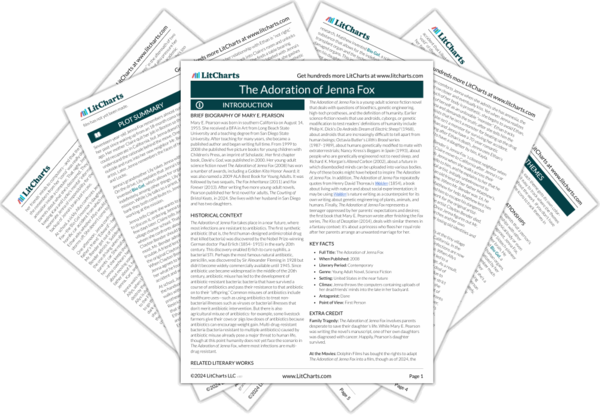In The Adoration of Jenna Fox, perfection and purity are opposing ideals—but the novel suggests that both ideals are ultimately harmful. Teenage protagonist Jenna Fox has always felt that her mother Claire and her biotech-pioneer father Matthew want her to be perfect. The pressure this feeling puts on Jenna leads her to ignore her own desires and interests in favor of pleasing her parents. For example, Jenna dances ballet because her mother is deeply invested in Jenna becoming a ballerina—even though Jenna herself prefers other forms of dance and feels she’s too tall for ballet anyway. After Jenna gets into a near-fatal car accident, her biotech-pioneer father uses his signature invention, Bio Gel, to rebuild Jenna’s body. Additionally, her parents decide to upload the high-school curriculum into Jenna’s cyborg brain to compensate for her missing school and to make her two inches shorter for improved post-accident “mechanics.” When Jenna realizes what her parents have done to her, she is horrified, feeling that her parents’ desire for perfection has led them to treat her like a commodity rather than a human being. Thus, the novel suggests that placing too much emphasis on perfection leads not to loving relationships, but to unfulfilling relationships and even objectification.
In the novel’s biotech-saturated world, the ideal of purity opposes the ideal of perfection. Whereas people like Jenna’s parents use technology to make their daughter more perfect, people like Jenna’s grandmother Lily want to keep humanity and nature “pure” and thus view biotechnological interventions into human life with deep suspicion. For much of the novel, Lily even doubts whether post-accident Jenna is really her granddaughter because so much of Jenna’s body, including her brain, is biotechnological rather than “original.” Like Jenna’s parents’ desire for perfection, Lily’s desire for human purity harms her relationship with Jenna. Thus, the novel suggests that neither perfection nor purity is ultimately a beneficial ideal—both are too extreme, leading to the dehumanization of “imperfect” or “impure” people.
Perfection and Purity ThemeTracker

Perfection and Purity Quotes in The Adoration of Jenna Fox
I don’t know if I will ever remember Jenna. The Jenna I was, at least. Father seems to think I will. Mother desperately wants me to. But letting go of something old and building something new that is all my own feels good. I want more of this feeling.
“You of all people should understand! If it weren’t for in vitro, I wouldn’t be here. You always called me your miracle. Why can’t I have one, too? Why do you get to decide when the miracles will end?”
It finally stops on my face. It rests there. Caressing. Watching. Watching what? The enthusiasm? The ruddy cheeks? The anticipation? Watching all the breaths, heartbeats, and hopes of Matthew and Claire Fox? For a moment, I can see the weight of it on Jenna’s face. My face.
To heaven? Is that where she thinks she’s going? Is she really sure of going to a place that isn’t even on a map? And how can she be sure she’d like it once she got there? But that’s Lily. One big question mark.
“You have to draw the line somewhere, don’t you? Medical costs are a terrible economic drain on society, not to mention the ethics involved. And by restricting how much can be replaced or enhanced, the FSEB knows you are more human than lab creation. We don’t want a lot of half-human lab pets crawling all around the world, do we?”
“So it’s not human skin.”
“It is human. Completely human. We’ve been genetically altering plants and animals for years. It’s nothing new. Tomatoes, for instance. We engineer them to withstand certain pests or to give them a longer shelf life, but it is still one hundred percent a tomato.”
“I am not a tomato.”
“I won’t even bring up the fact that I am two inches shorter now—acceptable ballerina height—another detail I know wasn’t an oversight.”
“They aren’t perfect, but none of us are ever exactly what we want to be, right?”
[T]hat day almost two years ago, Kara talked me into the red skirt. She was right. It was a change I needed. What happened to that red skirt?
All of your pieces fill up other people’s holes.
But they don’t fill
your own.











